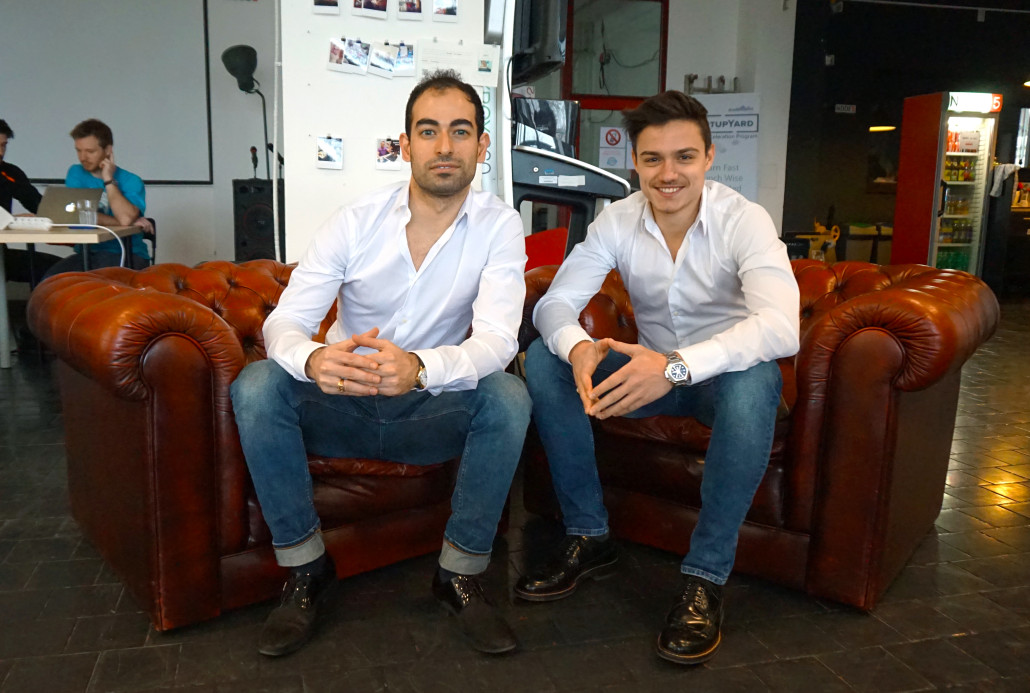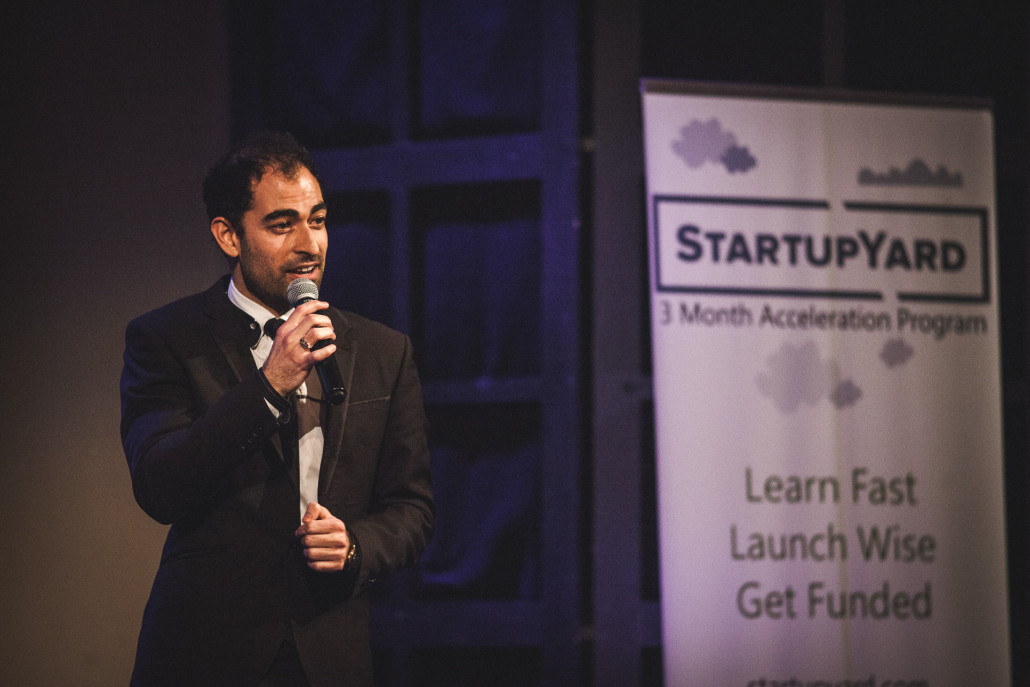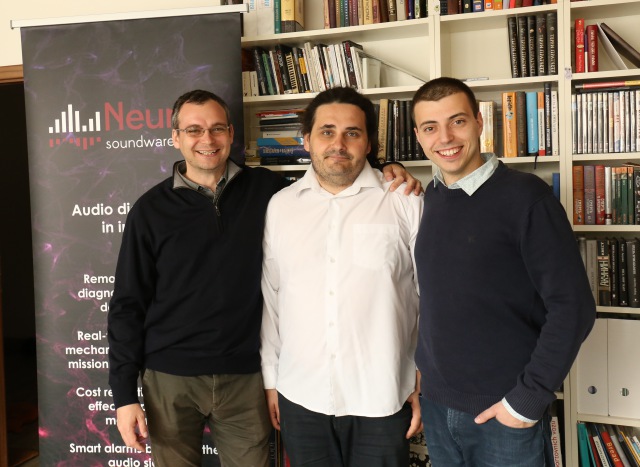StartupYard Alum SpeediFly Raises 300K In Seed Funding
/in Financing, Startups, StartupYard News/by StartupYardFor the second time in a matter of a few weeks, StartupYard is very pleased to announce that yet another StartupYard alum, SY 2016’s SpeediFly, has raised 308,000 euros in seed investment from Czech startup investor Petr Zamecnik.
Congratulations @SpeediFly raising 300K from Czech investor Petr Zamecnik via @startupyard Share on XThis is Zamecnik’s second investment in a StartupYard startup- it follows the recent announcement of his involvement with BudgetBakers’ (SY 2015) comparatively sized funding round. The investment includes follow-on financing from StartupYard, in the form of an equity-free grant, supplied thanks to the European Commission’s FIWARE Accelerate program.
Making Sharing a Flight as Easy as Sharing an Uber

Co-Founders Alex Karadjian, and Stoyan Dobrev
The team, which will work from both London and Sofia, Bulgaria, has launched a private beta in London, where it acquired its first customers in April this year. SpeediFly is a mobile-first travel platform that aims to make booking a last minute flight, even as a group, as easy as sharing a ride on Uber.
The funding will be used to expand the Bulgarian development team, and launch SpeediFly in several European markets, including London, and other major travel hubs.
The team also plans to develop the social travel aspects of the platform, as well as interest based travel recommendations that will allow travelers to combine their favorite activities with the best last-minute travel deals.
Currently in beta for iOS, SpeediFly also plans to expand to Android and the web. The new funds will also be used to expand the platform’s smart recommendation and group booking systems, two core features that will differentiate the startup from other entries in last-minute travel.
A Czech Investor on the Move
Our own Managing Director Cedric Maloux said of the investment round: “It’s not every week that two great companies from our portfolio get the financing they deserve. Zamecnik has made two smart and gutsy moves with these two startups [BudgetBakers and SpeediFly], and we hope that his peers in the region and abroad will take notice.”
Also commenting on the investment was SpeediFly’s Co-Founder and CEO Alex Karadjian, who said: “this will help us scale super quickly and go to new markets, but what is even more exciting to me, at least at this early stage, is the natural bond our team has had with Petr from the very moment we met. Petr’s fast-moving style as an investor and businessman perfectly aligns with the spirit of our team and with our concept- which is all about spontaneity and fun. I am sure this is going to be a great journey together.”

Alex Karadjian of Speedifly talks about social, spontaneous air travel at StartupYard’s 2016 DemoDay
SpeediFly was founded in late 2015, and joined StartupYard in 2016. It aims to be the market leader in mobile-first, social, last minute travel. In the UK alone, the company estimates that there is an untapped potential of 10.2 billion Euros in the last minute travel market. In addition, 56% of European travel searches for last minute bookings are for groups of 3 or more- while none of the major meta-search engines specialize in group bookings, social features, or shared payments.
SY Alum NeuronSoundware Wins Vodafone Napad Roku
/in Financing, Startups, StartupYard News/by StartupYardWe are incredibly pleased to announce that StartupYard 2016 team Neuron SoundWare, has won the prestigious competition Napad Roku. Napad Roku is put on by Vodafone Foundation to find the best ideas from Czech and Slovak startups, and bring them onto the global stage.

The Neuron SoundWare Team: Photo by Forbes.cz
Also among the top finishers was our own Salutara, enabling medical travel worldwide. This win represents yet another in our alumni’s series of recent successes.
The prize includes 300,000 CZK (11,000 Euros) from Vodafone Foundation, additional funds for legal services, and new tablet computers.
Napad Roku: The Best of Czechia and Slovakia
Neuron Soundware, led by Co-Founder and CEO Pavel Konecny, won out against over 170 competing startups. The company is building a framework for neural networks to understand, learn from, and process sounds. As reported by Forbes recently This will enable their technology to, for example, diagnose technical problems in heavy machinery and sensitive hardware, including such things as 3D printers, car engines, and air conditioning systems, among much else.
The technology can also be applied to the voice: at StartupYard’s recent DemoDay, where Neuron Soundware premiered the pitch that won at Napad Roku, Konecny demonstrated how a neural network could listen to, and then perfectly reproduce a human voice, opening up the possibility of using natural human voices instead of computer generated voices in any range of applications, from call centers to robots. The technology also makes manipulation of the voice possible, changing accents, inflections, emotional tone, and much else.
This opens possibilities for the NeuronSoundware team in a wide range of industries, from AI personal assistants like Viv, to industry 4.0 and distributed “contour” manufacturing technology, where more and more products will be fabricated in smaller factories, closer to their destination markets.
Congratulations to Pavel and the whole NeuronSoundware team!
 Pavel with CoFounder Filip Sedlak
Pavel with CoFounder Filip Sedlak
 Pavel Konecny, CoFounder and CEO
Pavel Konecny, CoFounder and CEO
Yes, We Still Need Accelerators
/in Life at an Accelerator, Starting a Business, Startup Tools/by StartupYarda few weeks ago, I was in attendance at Pioneers, in Vienna. It’s a great conference, and there were quite a few really interesting startups on display, including several of our own, like Claimair, TeskaLabs, and Satismeter. What’s more, it’s the right kind of conference for startups. Why is that? Well, as we’ve talked about in the past, there are a multiplying array of “startup industry” events out there, many of which deliver little benefit to actual startups.
Pioneers though, is pitched at investors for its exclusivity. Startups not only have to be selected for the Pioneers top 70, but they also attend for free. Investors, rightly, pay for the event, and for the opportunity to talk with so many promising founders.
There are a lot of VCs at Pioneers, and that’s a good thing. But there were few accelerators, and I think that’s a shame. Here, I’m going to talk about why I think so, and why we still need accelerators.
VCs and Backwards Goals
Part of going to Pioneers, for startups, is identifying fundraising goals. These are included in the company descriptions, and used to match startups with investors at the event. Fine so far.
Most startups, knowing that the event is aimed at tech VCs, say they’re looking for anything from 1 to 5 Million Euros. The average seemed to be about 1.5 Million. While it’s generally true that VCs want to invest in specific ranges, at specific stages, the truth is that most of the startups who are asking for those amounts don’t actually need the money right now. But in order to appeal to as many as they can, startups try to optimize their “ask,” before talking with the investors.
Instead of assessing their near-term business goals and funding needs, and narrowing their focus on a specific type of investor, they’ll craft a pitch for investors that portrays them as emerging companies that are “months away,” from a breakthrough advance that will turn the industry on its head.
The customers are just waiting to buy. The specific market need is a foregone conclusion. So really, in their imagining, it’s just a matter of the VC believing in the long-term prospects of the company and its industry, and assuming that the money is going to help them ride out their short-term challenges.
It’s a case of “get the money now, and figure out how to grow after that.”
It Doesn’t Work That Way

In order to paint rosy pictures about the future, founders tend to make startlingly bold predictions about their ability to do things that literally no one else has ever done in business. A new technology is new; and proving the market need for it is really at the heart of what an early stage startup should focus on. When I hear from a startup that their new technology is going to “change the way that X does Y” (eg: doctors diagnose cancer, or manufacturers bill distributors, or parents teach children), the first question I ask is “does X really want to change the way they do Y?”
Maybe they do. But then again, maybe they don’t. Maybe they do, but they want to do it in a completely different way. Maybe, maybe, maybe. Startups assume that investment is going to paper over those questions.
Ironically, VCs seem to operate according to the exact opposite assumption: a company that needs their money is not a company they want to invest in. Ideally, they would only invest in companies that have already proven they can make partnerships and sell, and the capital they receive will go mainly to doing more of what they already do well.
In effect, venture capital is an accelerant, not a fuel source. Startups treat it as a first step, when really it’s somewhere near the end of the process.
Why It Happens
Why then the disconnect? I think there are two problems:
1- Founders have been convinced that the “funding gap,” between early stage investors, -like business angels- and VCs is an artifact of the business; a bug rather than a feature. They become persuaded that they need to conform to what VCs expect, because VCs are too rigid, and need to have items checked off their list in order to invest. If they just tick the boxes, they’ll get the investment.
It doesn’t help that in some overheated markets, that’s really true. Some startups do seem to raise investment by ticking the appropriate boxes at just the right time.
But in reality, the funding gap is there mostly because it’s a bad idea for most investors to get involved with a company that doesn’t have product market fit, but wants to commit significant time and resources to developing new technology.
Simply, too much money at the wrong stage can be a bad thing. It can encourage a startup to build up technical debt without solving key issues of market fit. The funding gap can keep that from happening, by making it harder for startups to raise money at the wrong time, or for unsound reasons.2- VCs are not always motivated to tell founders about these concerns. They stay positive and encouraging, in case the startup suddenly proves it can really grow.
I can’t say how many times I’ve talked to a really impressive startup team, with really impressive technology, who are having problems raising money, and don’t know why they can’t. Investors seem impressed with them and their tech, and yet they don’t pull the trigger on investment.
“Everybody really likes it, and we’ve had really positive feedback. Some VCs are very interested in what we’re doing.” Of course they are, because why wouldn’t they be? But eyeing someone in a bar, and marrying them are two different things: startups can easily fall into the belief that “interest” equals “appetite.”
The Rule Book is No Good
Knowledge about the “startup industry,” and about investors has grown among startup founders. They’re now able to suss out and learn about the way VCs work, and the way they make decisions.
I was recently handed, at another conference I will not name directly, a literal book called the Startup Playbook. This kind of thinking predominates among people who neither invest in startups, nor run their own.
My belief is that this leads some founders to the mistaken conclusion that because they understand how VCs work, they can therefore get investment from VCs. However, the fact that a startup understands a cap table and has a clear idea of the kinds of things a VC invests in does not mean that they can get that VC to invest in them.
And this is where accelerators still play a vital role. There are plenty of stars in the tech industry who are simply unaware that they are stars. Because they play by the “rule book,” that everyone is increasingly aware of, they may forget that the rules don’t have to apply to them. And accelerators are, at the core, about breaking the rules.
We Still Need Accelerators
If you compare accelerators with other investors, we should look like odd ducks. We shouldn’t behave according to typical patterns. Because our appetite for risk should be unusually high, our tolerance for uncertainty should also be commensurately wide. Open questions, to us, should be good things, and sure things, less interesting.
That approach can really help startups to focus on doing what they do best, which is solving problems no one else knows how to solve. Where a lack of certainty may be a negative to a VC, it is ideal for us as a starting point. Uncertainty is something you can work with, and something you need in order to be truly unique. You have to question everything, and be questioned on everything.
Founders usually seem to expect an accelerator to behave the way a VC would: to be encouraging but vague. But more often than not, startups in the situation I’ve described end up expressing a sense of relief after a meeting: “I’m so glad we talked about this. I never get feedback that’s so direct.”
This is part of why VCs look more and more to accelerators to be the first movers in new market categories, new technologies, and new business concepts. More and more, our own contacts in the VC world turn to us not only for opportunities to invest in startups, but also to steer startups in our direction, hoping that the accelerator will be a proving ground for the team, the business, and the technology itself.
Attending an accelerator is not for every startup, but it is increasingly becoming a badge of confidence that VCs are looking for. And every year, we see VCs paying closer attention to our program, and others like it, to gain insights and opportunities they can’t get anywhere else.
SY Alum BudgetBakers Raises 300K, Welcomes New CEO
/in StartupYard News/by StartupYard
It’s our great pleasure to confirm today that BudgetBakers, a StartupYard 2015 alum, has raised a combined €290,000 in seed funding, from investor and gaming magnate Petr Zamecnik and former CEO of HomeCredit and GE Money, Ivan Svitek. Along with the funding round, BudgetBakers also announced, via Lupa.cz, that Michal Kratochvil, former Director of Accenture in Central Europe, has joined as the startup’s new CEO.
The team, formerly led by Jan Muller, who will remain as the company’s CTO and product manager, plans to roll out a full-featured personal financial management suite in 2016, accessible via web, Android and iOS, and has announced a series of integrations with partnering financial institutions, allowing its users to access their various financial services in one place. They will be capitalizing on new EU initiatives which encourage banks to integrate more closely with 3rd party finance and e-commerce platforms.
Since 2015, BudgetBakers has surpassed 1,000,000 downloads on Android, and is ranked among the most popular products in the AndroidPlay store for budgeting and expense tracking.
A Finance CEO for a Fintech Startup
Michal Kratochvil brings decades of experience in banking to his new head role at BudgetBakers, where he intends to push the company towards closer cooperation with consumer banking in Europe, and worldwide. On his new position, he said this week: “I’m pleased not only at the opportunity to lead a dynamic startup in a whole new and unexplored business, but also to bring my years of experience working with banks to bear in helping BudgetBakers forge new partnerships, and create amazing customer experiences in personal finance.”
StartupYard Managing Director Cedric Maloux was also pleased at the news of another in a series of recent successes for the accelerator, saying: “When we accelerated BudgetBakers in the Summer of 2015, they already had a very promising product with a large number of installs, but close to zero revenue. After 3 months at Startupyard, [BudgetBakers Founder] Jan Muller and the team focused on building a strong business model and B2B distribution channels. Today’s announcement is a confirmation that this work is paying off, and Michal joining as CEO is just going to put them into a new gear.”
We want to take this opportunity to congratulate Michal, Jan, and the whole BudgetBakers team on this big step towards realizing their goal of becoming an indispensable part of personal finance for people all around the world. Way to go!






